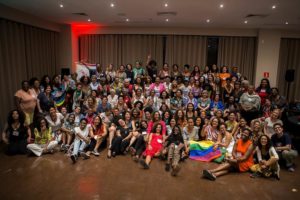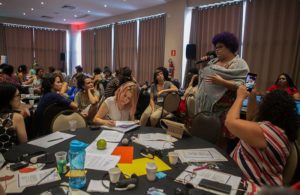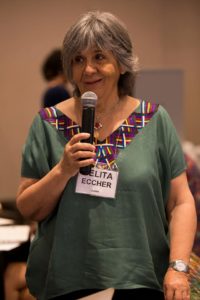
It was the end of September. Jair Bolsonaro had not won the elections yet. 110 women from all over Brazil got together in Rio de Janeiro to discuss about the current situation regarding women’s rights. The Second Dialogue of Women in Motion was organized by Elas Fund, British Council, OAK Foundation, Open Society Foundations Brazil and UN Women. The objective was to discuss opportunities to build alliances as well as to develop joint strategies for women’s movement. Ten women from other countries of Latin America and the UK were invited too. Celita Eccher participated representing DAWN.
The meeting was in honour of Marielle Franco, a politician from Rio de Janeiro, black and lesbian, who was killed on March this year. Her killing is still unpunished. That was the context of the dialogue: feeling the fear of a Bolsonaro`s victory, and however, feeling that the region has never had such a huge mass of feminists ready to think and act.
Brazil is one of the countries in the region that has more human rights deffenders assesinated. Afro religions are persecuted, trade unionists –among them domestic employees- are also persecuted. Migrants are trafficked, mostly Bolivians Venezolans, Mexicans and Africans. They work in illegal companies and in conditions of slavery.
The dialogue focused on stories of discriminations told by black, native, lesbian, trans, disabled women. It is not only a matter of discourse. It is not only Jair Bolsonaro showing his hate for black, LGTB and native people. Discrimination is placed on women’s bodies, which is also the place of resistance and fight.
Women’s bodies have a lot to do with democracy and agency. It is not only a matter of sexual and reproductive health and rights; the body is key for job, consumption, leisure, just to mention some human activities. With our bodies we feel pleasure and pain, we express creativity and energy, we get ill and old, we feel the power. At the the same time, politics have a clear effect on our bodies.
Black bodies
Quilombolas, a national coordination of communities of rural black women, are suffering violences and their lands are each time smaller. The territory of one of the most ancient quilombo of Brasil (272 years), 60 kilometres far from Brazilia, was reduced 83% three months ago due to real state speculation. Apparently, black people does not deserve so much land.
“We are free warriors in our lands. The land is sacred, animals are sacred, you cannot destroy or hurt them. Together with indigenous people, we are warriors of resistance”, says a quilombola from Maranhao. A woman cries while she tells that she has been threatened. Women in neighbourhoods say that they are never sure whether their sons or daughters were killed for being black.

Sexual workers bodies
A sexual worker, feminist and writer, told us that all along the world she has suffered persecution, not only due to her job but also for her activism. She has been attacked by the police, by real state agencies, by drugdealers.
Migrant bodies
Since the nineties, the number of refugees and inmigrant women has been increasing in Brazil. They are alone or with small kids. They come from Perú, Bolivia, Colombia, Ecuador, and recently, from Venezuela, Angola and the Republic of Congo.
Bolivians come to Brazil to survive; although they know that it is a violent country, they believe that their lives will become better. In same cases, they live as slaves, they received just a real (0.27 dollar) for each cloth they do. Usually they got ill because of chemical products.
Bolivian women suffer domestic violence and sometimes they are raped by employers, but they are afraid of telling this to the police. Most of them doesn’t speak Spanish, just Quechua and Aymara.
Brazil used to be a hospitable country, but it is not any more. There is rascism and xenophobia.

LGTB bodies
In Brazil, The Universal Church has spiritual control of jails with its plan “Christian Pact for Life”, supported by the government: they say LGTB people needs to be healed and that they have to get the devil away from them.
A woman denounces that lesbian women have suffered corrective rapes.
Disabled bodies
Disabled women are also fighting in Brazil. Fighting for their right to be visible, to be considered as women, to have rights, to have access to work and leisure, to have infraestructure accesible for them. They fight for their right to have children, to be able to talk about their situations.
All bodies
The main challenge in this context is to be united, to denounce, to support each another. To consider the intersectionality of multiple discriminations. To develop strategies for being safe. To get more women into politics, to fight fascism there too. It is important to train young black women so as they can be politicians and take the power. Young people at the front and old people at the back, supporting them.
We have a common horizon: to create utopias to defend the rights of each discriminated group. To share resources of any kind. To put rascism and patriarchy at the center of our fights. To build alliances. To speak to each other. We are equal, and we all need each other to fight fascism.
